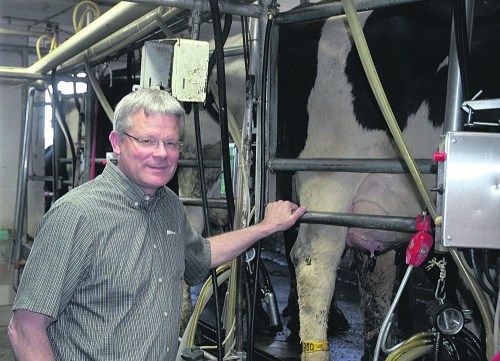COVID-19 fallout threatens farmers, ranchers
Published 1:00 pm Monday, April 6, 2020

- Alan Reed, owner of Reed’s Dairy in Idaho Falls, Idaho, says the free fall in the price of milk is a threat to the industry.
IDAHO FALLS, Idaho — The coronavirus pandemic is taking its toll on agriculture with lost markets and declining prices.
Milk is being dumped, produce is being left to rot and some producers are worried they won’t have an operation left to hand down to the next generation.
Trending
Milk prices have declined 26% to 36% depending on its utilization. Prices have fallen as much as 31% for cotton and hogs, 25% for cattle, 14% for corn and 8% for soybeans, according to American Farm Bureau Federation.
“The entire supply chain is trying to adapt to match supply with the changes in demand. Meanwhile, the markets continue to swing daily,” Zippy Duvall, AFBF president, said in a phone conference with reporters on Friday.
Jim Alderman, a produce grower in Southern Florida, has been farming for 40 years and said he’s been through freezes, floods and hurricanes but has never seen anything like this.
“What is happening to us today is that the food service industry is basically shut down,” he said
Hotels, clubs, all the restaurants are closed — and that’s creating a backlog. Squash, for example, has to be picked every day. If it doesn’t get picked, it gets too big to sell. The market today is about $4 and change for a half bushel box of yellow squash or zucchini squash, he said.
“That is way below our cost of picking and packing. … There’s no sense in packing it because there is no sale for it,” he said.
Trending
Some growers are cutting squash every day and throwing it on the ground, hoping the market will turn around, he said. A lot of the area’s produce typically goes to the food service industry, and prices are down significantly from a couple of weeks ago, he said.
“We’re in a bad situation. It’s hard to have a crop out there that you just can’t sell,” he said.
Alan Reed owns a small dairy in Eastern Idaho and has a home milk-delivery business and four stores selling ice cream and cheese. He also sells into grocery stores and restaurants.
The home deliveries are doing fairly well, and sales to grocery stores have stayed pretty steady. But traffic at his stores has pretty much stopped, and sales to restaurants are shut down.
He hasn’t had to dump any milk yet, but food service closures have led to an oversupply of milk nationally and nowhere to go with it, he said.
“The price of milk is coming down, and it’s going to turn into a real hardship for us dairymen,” he said.
Peter Bakken runs a cattle operation with his brother in Southwest Minnesota. The cows are calving right now, and it’s pretty much business as usual on that front.
“The marketing aspect is what really hurt,” he said.
The brothers are just trying to keep the fourth-generation operation going right now, he said.
“This is a management nightmare trying to do the best you can and through no control of your own,” he said.
He doesn’t know if he’s looking at a million-dollar loss that puts the operation at risk so the fifth generation can’t come back to it, he said.
“I think a lot of people are probably in a similar situation,” he said.
He considers himself a fairly fortunate and well established farmer, but it’s going to hurt his business. And for a young person trying to get into the business, it’s going to be a real uphill battle, he said.









